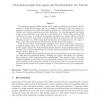Free Online Productivity Tools
i2Speak
i2Symbol
i2OCR
iTex2Img
iWeb2Print
iWeb2Shot
i2Type
iPdf2Split
iPdf2Merge
i2Bopomofo
i2Arabic
i2Style
i2Image
i2PDF
iLatex2Rtf
Sci2ools
110
click to vote
CRYPTO
2010
Springer
2010
Springer
i-Hop Homomorphic Encryption and Rerandomizable Yao Circuits
Homomorphic encryption (HE) schemes enable computing functions on encrypted data, by means of a public Eval procedure that can be applied to ciphertexts. But the evaluated ciphertexts so generated may differ from freshly encrypted ones. This brings up the question of whether one can keep computing on evaluated ciphertexts. An i-hop homomorphic encryption scheme is one where Eval can be called on its own output up to i times, while still being able to decrypt the result. A multi-hop homomorphic encryption is a scheme which is i-hop for all i. In this work we study i-hop and multi-hop schemes in conjunction with the properties of function-privacy (i.e., Eval's output hides the function) and compactness (i.e., the output of Eval is short). We provide formal definitions and describe several constructions. First, we observe that "bootstrapping" techniques can be used to convert any (1-hop) homomorphic encryption scheme into an i-hop scheme for any i, and the result inherits ...
CRYPTO 2010 | Cryptology | Homomorphic Encryption | Homomorphic Encryption Scheme | Multi-hop Homomorphic Encryption |
| Added | 08 Nov 2010 |
| Updated | 08 Nov 2010 |
| Type | Conference |
| Year | 2010 |
| Where | CRYPTO |
| Authors | Craig Gentry, Shai Halevi, Vinod Vaikuntanathan |
Comments (0)

